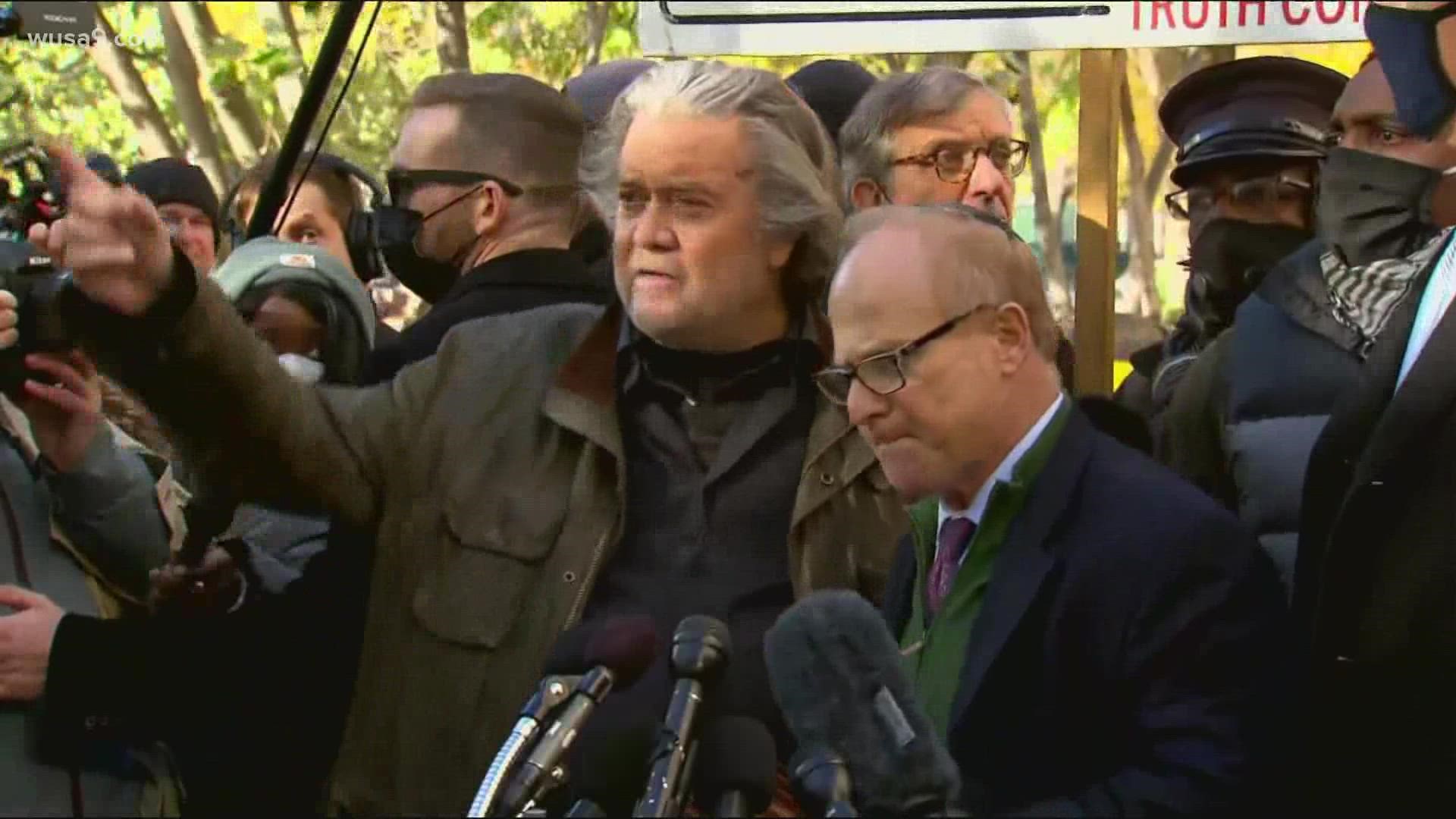WASHINGTON — A federal judge on Wednesday denied former Trump adviser Steve Bannon’s motion to dismiss a criminal indictment against him on two counts of contempt of Congress.
U.S. District Judge Carl Nichols, who was appointed to the D.C. District Court by former President Donald Trump in 2019, heard hours of arguments from Bannon’s legal team and federal prosecutors. Bannon’s attorneys presented the judge with several arguments as to why the indictment should be dismissed – not the least of which was, they said, that Bannon was protected by executive privilege – but “each falls short,” Nichols said.
Bannon was subpoenaed by the committee in late September as part of its ongoing investigation into the Jan. 6, 2021, assault on the U.S. Capitol Building. In a letter, Chairman Rep. Bennie Thompson (R-MS) said the committee believed Bannon was present at the Willard Hotel in D.C. on Jan. 5, 2021, “during an effort to persuade Members of Congress to block the certification of the lection the next day.” Thompson said the committee was also interested in Bannon’s communications with Trump and a statement he made on Jan. 5 that “[a]ll hell is going to break loose tomorrow.”
PREVIOUS COVERAGE
Bannon, a former investment banker at Goldman Sachs and co-founder of the right-wing Breitbart News, was the CEO of Trump’s 2016 presidential campaign and served for eight months at the beginning of Trump’s administration as a senior counselor to the president. Bannon’s attorneys argued his role as a White House employee should shield him from prosecution and pointed to a number of Office of Legal Counsel opinions about not indicting White House employees for contempt of Congress.
Nichols said that argument failed on two fronts. First, Bannon had long since left the White House and returned to being a private citizen on Jan. 5. And second, Nichols said, it remained a “factual question” as to whether Trump – no longer in the White House himself at that point – had even asserted executive privilege in Bannon’s case at all. Nichols pointed to letters from Trump’s attorneys saying they didn’t believe Bannon had immunity.
“Nothing in these letters unambiguously instructed Mr. Bannon not to turn over any documents or to appear at all,” Nichols said.
Other arguments raised by Bannon also failed. Nichols said he could not, as a matter of law, rule on whether the January 6th Committee was legitimate. Further, he said, it appeared the full House had ratified the committee’s actions on multiple occasions by voting, for example, to refer Trump trade adviser Peter Navarro, chief of staff Mark Meadows and others to the Justice Department for criminal contempt of Congress.
“The bottom line is: The motion to dismiss the indictment is denied,” Nichols said.
Nichols said Wednesday he would take four evidentiary motions before him under advisement. They include the question of whether Bannon will be able to present evidence about his compliance with other congressional subpoenas in the past, and whether a jury can hear about the OLC opinions he says he relied on to determine he wouldn’t be prosecuted for failing to show up for his deposition. Without ruling on the issue, Nichols addressed the latter, saying he thought the argument wouldn’t hold up.
“I’m disinclined to believe there is a legitimate entrapment by estoppel defense there,” Nichols said. Entrapment by estoppel is a defense that has been rejected in other Jan. 6 cases as well from defendants who’ve tried to claim they entered the Capitol because Trump told them to.
Bannon’s trial was scheduled to begin July 18, although one of his attorneys, David Schoen, said they may file a motion to move that date. Schoen pointed to the ongoing January 6th Committee hearings and other public statements by congressional Democrats about Jan. 6 cases.
Nichols ordered attorneys from both sides to present him with suggested jury instructions by June 30 ahead of his decision on the pending evidentiary motions.
If convicted at trial, Bannon faces a mandatory minimum sentence of 30 days in jail and a maximum sentence of one year, along with a maximum fine of $100,000.
We're tracking all of the arrests, charges and investigations into the January 6 assault on the Capitol. Sign up for our Capitol Breach Newsletter here so that you never miss an update.

